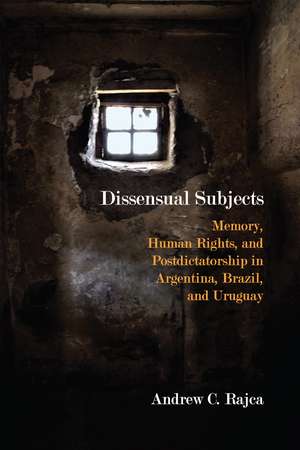Dissensual Subjects: Memory, Human Rights, and Postdictatorship in Argentina, Brazil, and Uruguay: Critical Insurgencies
Autor Andrew C. Rajcaen Limba Engleză Hardback – 15 feb 2018
In Dissensual Subjects, Andrew C. Rajca combines cultural studies and critical theory to explore how the aftereffects of dictatorship have been used to formulate dominant notions of human rights in the present. In so doing, he critiques the exclusionary nature of these processes and highlights who and what count (and do not count) as subjects of human rights as a result.
Through an engaging exploration of the concept of “never again” (nunca más/nunca mais) and close analysis of photography exhibits, audiovisual installations, and other art forms in spaces of cultural memory, the book explores how aesthetic interventions can suggest alternative ways of framing human rights subjectivity beyond the rhetoric of liberal humanitarianism. The book visits sites of memory, two of which functioned as detention and torture centers during dictatorships, to highlight the tensions between the testimonial tenor of permanent exhibits and the aesthetic interventions of temporary installations there. Rajca thus introduces perspectives that both undo common understandings of authoritarian violence and its effects as well as reconfigure who or what are made visible as subjects of memory and human rights in postdictatorship countries.
Dissensual Subjects offers much to those concerned with numerous interlocking fields: memory, human rights, political subjectivity, aesthetics, cultural studies, visual culture, Southern Cone studies, postdictatorship studies, and sites of memory.
Through an engaging exploration of the concept of “never again” (nunca más/nunca mais) and close analysis of photography exhibits, audiovisual installations, and other art forms in spaces of cultural memory, the book explores how aesthetic interventions can suggest alternative ways of framing human rights subjectivity beyond the rhetoric of liberal humanitarianism. The book visits sites of memory, two of which functioned as detention and torture centers during dictatorships, to highlight the tensions between the testimonial tenor of permanent exhibits and the aesthetic interventions of temporary installations there. Rajca thus introduces perspectives that both undo common understandings of authoritarian violence and its effects as well as reconfigure who or what are made visible as subjects of memory and human rights in postdictatorship countries.
Dissensual Subjects offers much to those concerned with numerous interlocking fields: memory, human rights, political subjectivity, aesthetics, cultural studies, visual culture, Southern Cone studies, postdictatorship studies, and sites of memory.
Preț: 700.68 lei
Preț vechi: 909.96 lei
-23% Nou
Puncte Express: 1051
Preț estimativ în valută:
134.07€ • 146.09$ • 112.98£
134.07€ • 146.09$ • 112.98£
Carte indisponibilă temporar
Doresc să fiu notificat când acest titlu va fi disponibil:
Se trimite...
Preluare comenzi: 021 569.72.76
Specificații
ISBN-13: 9780810136373
ISBN-10: 0810136376
Pagini: 264
Dimensiuni: 152 x 229 x 23 mm
Greutate: 0.45 kg
Editura: Northwestern University Press
Colecția Northwestern University Press
Seria Critical Insurgencies
ISBN-10: 0810136376
Pagini: 264
Dimensiuni: 152 x 229 x 23 mm
Greutate: 0.45 kg
Editura: Northwestern University Press
Colecția Northwestern University Press
Seria Critical Insurgencies
Notă biografică
ANDREW C. RAJCA is an assistant professor of Portuguese and Spanish and the Portuguese program director at the University of South Carolina.
Cuprins
Acknowledgements
Illustrations
Introduction
1. Nunca más/Nunca Mais: The Ethical Fusion of Memory and Human Rightsin Postdictatorial Culture
2. The Politics and Aesthetics of Resistance: Memory and Subjectivity at the Memorial da Resistência in São Paulo, Brazil
3. Melancholy and Dissensus: Postdictatorial Subjectivity at The Centro Cultural y Museo de la Memoria (MUME) in Montevideo, Uruguay
4. Aesthetics, Politics, and the Subjects of Memory and Human Rights at the Espacio para la memoria y la promoción y defensa de los derechos humanos (ex-ESMA) in Buenos Aires, Argentina
Conclusion: Beyond the Ethical Fusion of Memory and Human Rights in Postdictatorship
Notes
Bibliography
Index
Illustrations
Introduction
1. Nunca más/Nunca Mais: The Ethical Fusion of Memory and Human Rightsin Postdictatorial Culture
2. The Politics and Aesthetics of Resistance: Memory and Subjectivity at the Memorial da Resistência in São Paulo, Brazil
3. Melancholy and Dissensus: Postdictatorial Subjectivity at The Centro Cultural y Museo de la Memoria (MUME) in Montevideo, Uruguay
4. Aesthetics, Politics, and the Subjects of Memory and Human Rights at the Espacio para la memoria y la promoción y defensa de los derechos humanos (ex-ESMA) in Buenos Aires, Argentina
Conclusion: Beyond the Ethical Fusion of Memory and Human Rights in Postdictatorship
Notes
Bibliography
Index
Recenzii
“Rajca delivers a powerful and impressive critique of memory politics in the Southern Cone and Brazil. Skillfully written, this book is certain to impact the way scholars interpret the relationship between human rights and memory in Latin America and beyond.” —Rebecca J. Atencio, author of Memory’s Turn: Reckoning with Dictatorship in Brazil
"This book presents a new approach to the field of memory studies, opening up a different way of looking and questioning how to deal with problems of social injustice and inequality beyond the usual logic of resistance and victimhood." —Susana Draper, author of Afterlives of Confinement: Spatial Transitions in Postdictatorship Latin America
"In a field where the consensus around human rights violations has become a master narrative of victimhood, Rajca's theoretical intervention problematizes the so called “depoliticized ethical turn,” proposing an alternative reading of the relationship between politics, ethics and aesthetics. This work redefines the politics of visibility imposed by the Nunca Más/Nunca Mais State's dictum, liberating the political emancipatory potential of the bare human." —Fernando A. Blanco
Descriere
Dissensual Subjects is a fascinating, interdisciplinary exploration of memory and human rights in postdictatorial Brazil, Uruguay, and Argentina that will interest readers concerned with political subjectivity, aesthetics, cultural studies, visual culture, Southern Cone studies, postdictatorship studies, and sites of memory.














